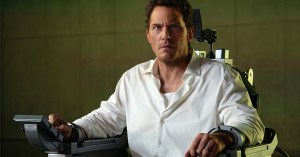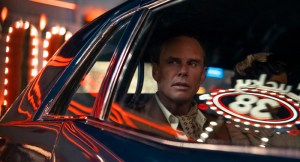Five Favorite Films with Paul Bettany
The Margin Call star talks Occupy Wall Street and busking before acting.
From vengeance-obsessed priests to tennis pros, from English naturalists to sentient computers, Paul Bettany has played a wide range of characters in his big-screen career. In his latest, Margin Call, Bettany plays a high-rolling investment banker whose company is on the verge of collapse — an internal crisis that just might take the whole economy down with it. In an interview with Rotten Tomatoes, Bettany shared his favorite films, and also discussed Occupy Wall Street, why he (sort of) empathizes with bankers, and the difference between busking and filmmaking.
In the Name of the Father (Jim Sheridan, 1993; 95% Tomatometer)
There’s so much to like about it. Really brilliant script. I think it’s an amazingly directed movie. It’s the real trick of that movie, to come out feeling that you’re Irish and hate the English, especially when you’re English, which I am. [laughs] It is one of the most exquisite performances of all time. I saw it when I was a student of acting, and there was lots of people to admire; there was Robert De Niro, and there was Al Pacino, and here was an English person, making such a complete and visceral transformation in character that you just went, “Oh my God, we’re allowed to do that sort of thing, too?” That felt really empowering.
Brief Encounter (David Lean, 1945; 86% Tomatometer)
Brief Encounter, I think, is just an exquisite movie. I think I see it at least once a year. It’s a Noel Coward and David Lean movie, and it’s so ahead of its time in so many ways. Visually, it’s ahead of its time. Oh my God, it’s like a piece of music. That sequence of lines in it, when they’re out in the countryside, and he says, “Are you cold, darling?” And she says, “No, not really.” He says, “Are you happy?” And she says, “No, not really.” It’s f—ing heartbreaking. I mean, it pulls every string; it’s beautiful. And it’s also a movie that’s… the first movie I can think of — maybe I’m wrong — where a woman has an affair and is the hero of the piece, and isn’t vilified by the piece. The husband is not evil; you know, the husband is kind of wonderful , and at the end he says, “You’ve been so very far away, and I’m glad you’ve come home,” and all of that. It’s just beautiful.
Raging Bull (Martin Scorsese, 1980; 98% Tomatometer)
Raging Bull. I defy anybody to point out one thing that’s wrong with it. It’s just perfect. There’s nothing in that movie that could be cut out that would make it better. It just feels so lean and perfect. Every moment doesn’t lose sight of what it’s about, you know? Every shot is animal. It’s amazing. Although I think it’s really hard to do jealousy, because jealousy’s a bit like seasickness in that it’s awful if it’s happening to you but f—ing funny to watch. You know, somebody puking off the side of a boat or somebody being jealous, you look like such a moron, but if it’s happening to you, and you’re jealous, it’s f—ing appalling. Somehow, in that movie, what it pulls off is, it’s never funny. It’s just f—ing awful, he’s just an animal, and it’s the threat of violence the whole time. It’s amazing and beautiful.
Prick Up Your Ears (Stephen Frears, 1987; 100% Tomatometer)
Prick up Your Ears, Gary Oldman. Great movie. That is another extraordinary performance that feels so total and complete, you know?
It’s A Wonderful Life (Frank Capra, 1946; 95% Tomatometer)
I love that movie. Again, what’s wrong with that movie? Not a f—ing lot, right? Really lean piece of socialist storytelling that’s just gorgeous.
Next, Bettany talks about Occupy Wall Street, why he (sort of) empathizes with bankers, and the difference between busking and filmmaking.
RT: In Margin Call, your character, Will Emerson, has a speech at the end where he’s talking about how, if the banks keep making money, everybody’s happy and no one asks any questions, but if they fail, it’s all their fault. Do you empathize with that? Because essentially, you’re giving voice to the banker in that case.
Paul Bettany: Well, here’s the thing. What I like about [Will] is that he’s very conscious of who he is. He’s very aware. He doesn’t think he’s a nice man, and he doesn’t think he’s a particularly fair man. I don’t think he thinks life is fair. I think he sees life as a sporting event. He wants to be first to the punch, but if he gets clipped on the chin, he’s not going to whine about it in the corner saying, “He hit me!” And those aren’t my feelings, and they’re not my politics, but I admire being that clear and honest about who you are, you know? A bit of it that I do understand and do think about is, you know, we’ve been f—ing the third world for hundreds of years, and nobody’s batting an eyelid about it. It’s only when it came home [laughs] and bit us on the ass that people kind of got livid. I guess that’s his point; he doesn’t like the hypocrisy of it all. So I understand that.
You know, I met these people [bankers]. I went to meet these people, and the problem with meeting people is you’re immediately faced with a human being, and you can’t just judge them as a villain any longer. They’re very bright, clever, imaginative people. Zachary Quinto plays a guy from MIT, and these companies, they go to MIT and they lure young — in this case — rocket scientists away from rocket science. And what would the world look like if that mind was being put to work in building f—ing rockets, you know what I mean?
So on one level, I also think it’s a sort of tragedy about wasted minds and intellect, but also — and I think this is a really important thing to realize — it is a waste of everybody’s time. People are sort of begging for blood, but it is a waste of time to sort of look at individuals. Asking a merchant banker not to be greedy is like asking a lion to settle down and stop eating meat. [laughs] You know, it’s not in their nature; it’s their job description. They get rewarded, the more money and wealth that they corral for their firm. So, what needs to happen, surely, is… Perhaps our time would be better spent pointing the finger at government and saying there should be tighter regulations on these people, and the onus is on the government to leash or muzzle Wall Street, because they can’t f—ing do it themselves.
If the characters in this movie were just evil, cigar-chomping plutocrats, or if they were heroes, it wouldn’t work. The fact that these are real people adds a certain power to the whole thing.
Yeah, I think so. It’s just too reductive. It’s too reductive. And, you know, on the outside, I’ve read magazine articles where people are being reductive about the protests, saying, “Well, you know, only seven percent were able to answer the question ‘What was the Glass-Steagall Act?’ and only four percent really understood the Volcker Rule.” Well, you know what? Anybody would be hard pressed to understand the Volcker Rule because it hasn’t been enacted yet, and you’re missing the point. The point is, people feel angry, and in 2000 a band-aid was put across a gaping wound, and it was still hemorrhaging. So, to sort of point fingers and say, “They don’t understand the world of finance”… You don’t have to have a PhD in Economics to realize you’ve been taking it in the seat for years. They should be heard; people should hear if people are f—ing livid. They’re livid. They’ve got a right to be livid, and it’s so great that we live in a world where you can take to the streets without being shot down.
Shifting gears slightly, I noticed you play a lot of roles in which you’re a spiritual warrior — I’m thinking Priest, Legion, and The Da Vinci Code. Is there something about that that appeals to you? You said earlier that you liked that your character in Margin Call wasn’t a hypocrite; do you like characters that sort of see things in black and white?
No, I don’t. I think, conversely, I sort of see the job of my life being a process of becoming less judgmental as I get older. That’s what I want to do. Acting has so many vain and awful things about it, but one of the really edifying things about it is you can, at times, get the opportunity to put yourself imaginatively in another human being’s position and try to see things from their perspective. I see that as a real gift, and I hope that this is part of making me a better human being, whatever that f—ing means. But I mean it, you know? I do at least mean it. I really want to make films that I care about, and this film really sparked an awakening in me, just remembering all of the reasons I initially wanted to be an actor. It was just a fantastic experience. Seventeen days, we shot this f—ing movie; it was just unbelievable. It was an unbelievable comradely experience, and I hanker after it. You know, I’ve been on jobs that were seven months long, and I have many more memories of this job than those.
Speaking about going back to when you wanted to be an actor, before you made it into the movies, you were a street musician. Is there anything about that job that prepares you for acting in the movies?
Jesus, I don’t know. I’ve never given it much thought. No… No, I don’t know. I don’t know. Maybe, in that you’re… I don’t know, man! I can’t answer that question. It’s a really good one, but one that I can’t actually answer without giving it proper thought.
I thought there might be something similar about playing off an audience, but I guess in the movies, it’s not quite the same thing.
Well, it’s interesting. You know, I was able to look at a group of kids that were sitting on the stairs when I used to busk, which is play music, and I’d be able to judge whether they were French or, you know, what their nationality was. So if they were French, I would think, “Well, the Cure are huge in France, so I’ll play a bunch of Cure songs.” So I suppose in sort of recognizing what your audience wants, but I say that with trepidation because I’m not sure we should necessarily give the audience what they want. [laughs] You know what I mean? We live in a world where you make a film — you spend two years in development, and then you spend six months in prep, then you shoot it for four months, and then spend another year editing it, and then you take it to a small town outside San Diego and show it to 60 teenagers, and then change your movie depending on what they say. I’m lost. Now you’ve lost me, because, you know, every 16-year-old boy is going to say, “I think it should be a bit more like Underworld,” you know what I mean? Should we then make every film a bit more like Underworld? I’m not sure that that’s a great way to go about creating new stuff.
Margin Call opens in theaters this week.





